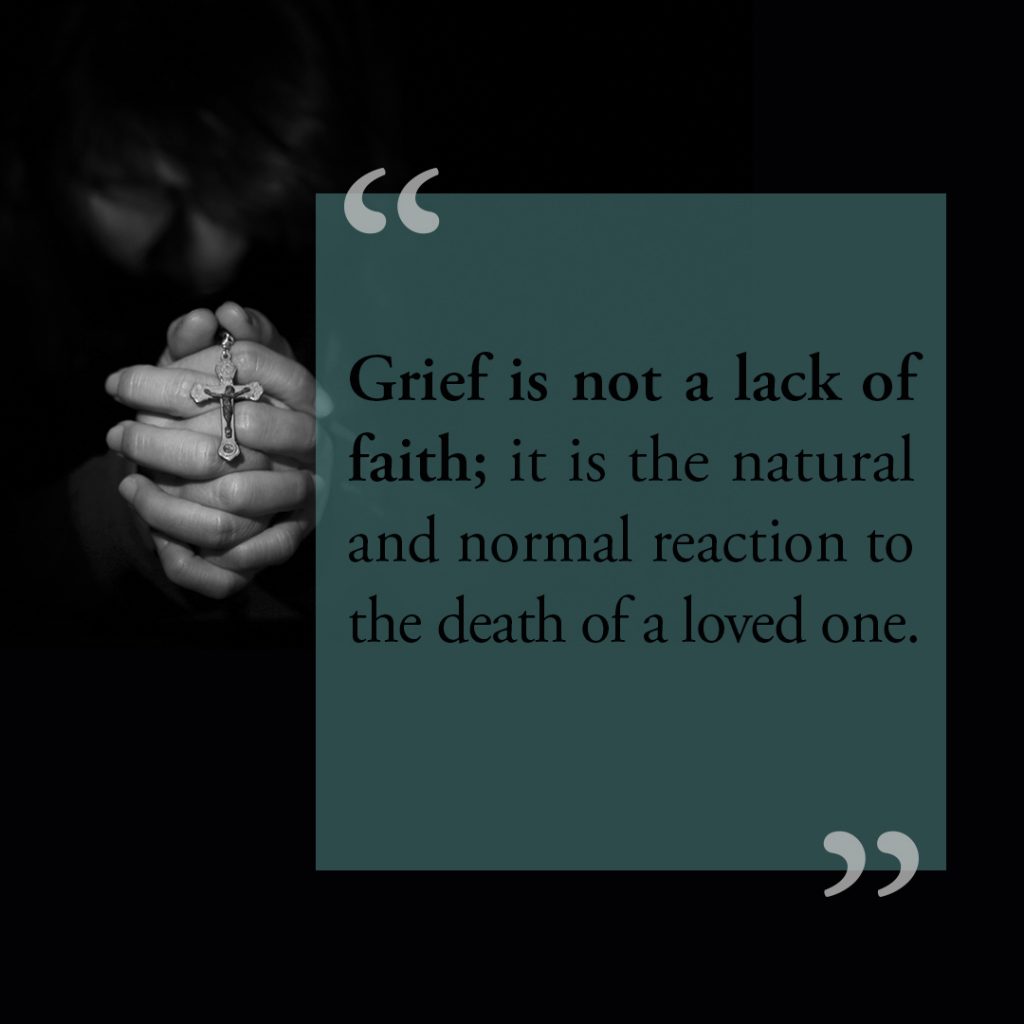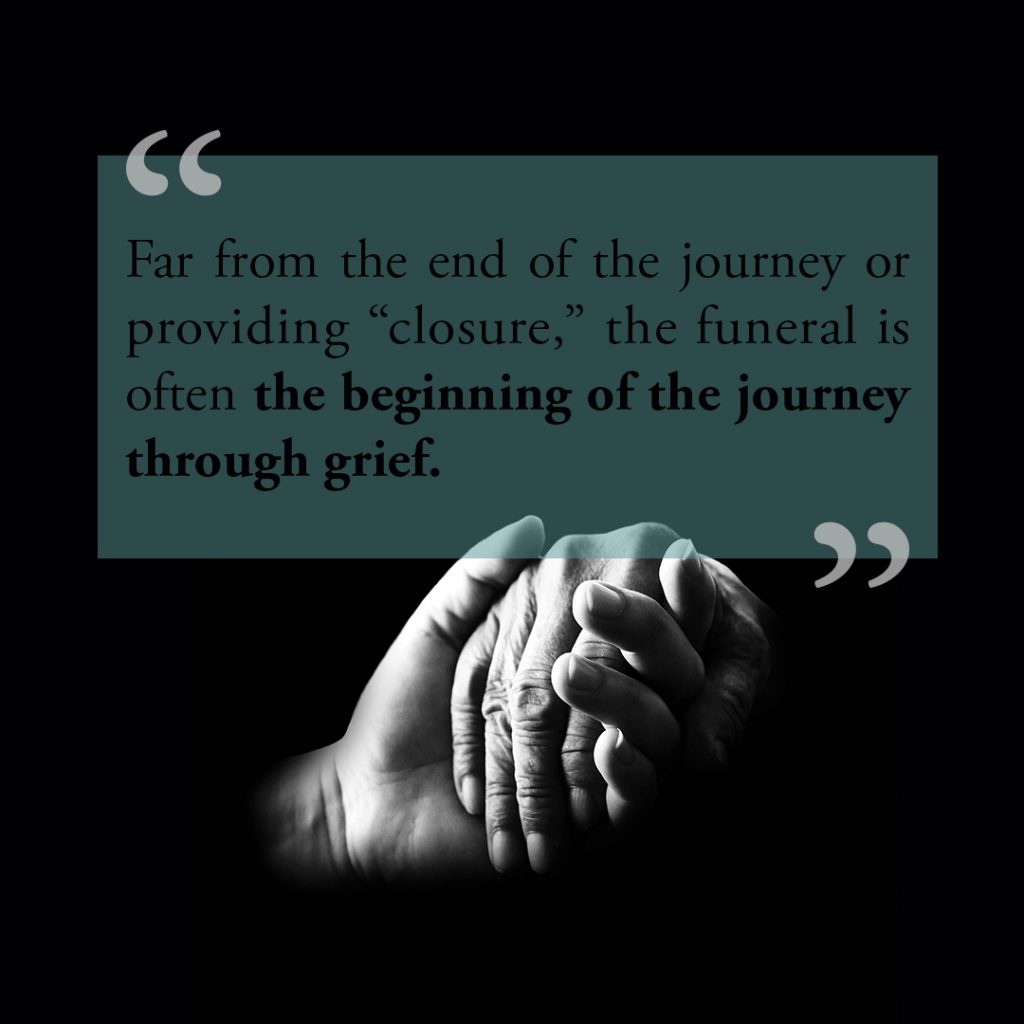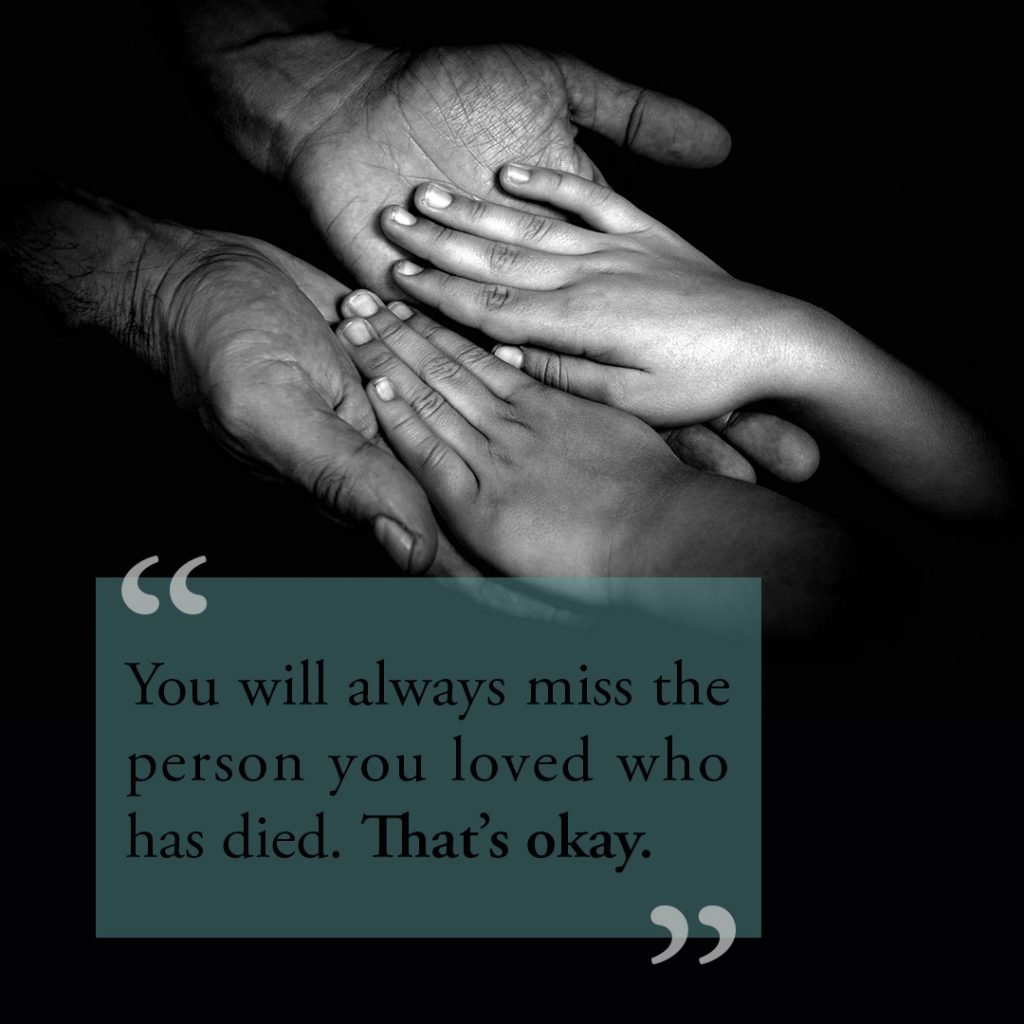The Journey Through Grief

by Michael Keith
You don’t get over it; you get through it.
As a pastor I have journeyed through the valley of the shadow of death with many people. The loss of a loved one leaves us profoundly hurt and broken. We experience emotions of grief that at times can feel overwhelming. The loss of a loved one is one of the most difficult experiences we go through in life.
Many Misconceptions
There are many misconceptions surrounding grief that can lead to false expectations for someone experiencing grief as well as family and friends seeking to lend support and encouragement. One of the biggest misconceptions is that grief is something like the common cold. You have it for a while and then you get over it and get back to “normal.” That’s the great desire for those in grief and those who are seeking to lend support—for things to get back to normal. The idea seems to be that you have grief for maybe six months or at most a year, and then you “get over” it.
The harsh reality is that this never happens. That is the pain of death. What once was can never be again. You don’t get over it; you get through it.
This raises the misconception of “closure.” Many look forward to a funeral so they can gain “closure”—as if, after the funeral, all the grief and mourning can be left behind. That is not how it works for most people. It is far more helpful to see the funeral as something near the beginning of the journey through grief. It is the public recognition that a death has occurred. It is the community, the body of Christ, gathering to receive strength and encouragement from God so that they might then in turn offer support and encouragement to each other. It is a time where we gather before God to give thanks for giving life to this person and for the opportunity we had to share in it. More than this, it is a time to give thanks for the eternal life that was secured for our friend by Jesus. Far from the end of the journey or providing “closure,” the funeral is often the beginning of the journey through grief.

Another common misconception is that grief and mourning are the same thing. It is helpful, however, to make a distinction between them. Grief is the emotion and feelings that you experience on the inside as a result of a loss. Mourning is instead the public expression of those emotions. One of the great struggles we have in our culture is that we have very few places and avenues for people to mourn. Our culture does not allow for the public expression of grief; it makes us uncomfortable when someone openly grieves. Yet mourning is essential to a healthy journey through grief. We must allow ourselves and those around us to mourn. We must be able to express grief. If you are experiencing grief, it is important for you to find a friend or a group where you can feel comfortable expressing your feelings of grief and authentically mourn. And this is likely to be something you will need to do a number of times in your journey through grief. Expressing the emotions of grief in mourning is a healthy part of the journey. How you experience and express your grief in mourning can be intensely personal and will not look the same for everyone. But it is essential to a healthy journey.
The Lord gives You Himself to uphold and sustain you in this journey. He has also given you His Church in which you will find companions on your journey to support and encourage you. Seek out those whom the Lord has placed in your life for the support that you need.
The journey through grief does not generally follow a straight line. It seldom progresses in orderly stages, despite the common misunderstanding. You seldom complete one stage and then move on to another until you are through all the stages and “over” your grief. You don’t get over it; you get through it.
One image that many people find helpful when thinking about the emotions of grief is that of waves. When the death of a loved one occurs, the waves of grief come in high and hard and constant, and it feels as if you are drowning in them. Then, as one journeys healthily on through grief, the experience of the waves of grief change. They don’t go away—they likely never will—but they may not be as high and hard and constant. They will still come, but they may not knock you down every time. Certain days and events and times of year, like Christmas or birthdays or anniversaries or Mother’s Day and Father’s Day, may result in higher and stronger waves, even many years after the death of a loved one. That’s perfectly understandable and to be expected. You will always miss the person you loved who has died. That’s okay.
Faithful Grief
There are some people who think that experiencing grief is somehow a sign of a lack of faith—that as a Christian you should be happy that your loved one is resting with Jesus and that experiencing grief demonstrates a lack of faith. This is a terrible burden to place on someone in mourning and represents a misunderstanding of what grief is. Grief is not a lack of faith; it is the natural and normal reaction to the death of a loved one. The physical separation from our loved ones is one of the great pains of death. And while we may draw great comfort from the knowledge that our loved one is safely resting with Jesus awaiting the Last Day, we still weep that they are not here to carve the turkey at Christmas.
Grief is a part of life in this fallen world. It is inevitable. “For in the day that you eat of it you shall surely die,” God warned Adam (Genesis 2:17). Ever since our first parents’ disobedience and fall into sin, we have suffered under that punishment. As we experience the death of loved ones, we will experience the emotions of grief.
There are some people who think that experiencing grief is somehow a sign of a lack of faith—that as a Christian you should be happy that your loved one is resting with Jesus and that experiencing grief demonstrates a lack of faith. This is a terrible burden to place on someone in mourning and represents a misunderstanding of what grief is.
Some of you may be feeling the intense emotions of grief right now. That’s okay. There is no need to hide that or pretend it is not so. Seek out appropriate places and ways where you can express your emotions of grief in authentic mourning. The shelf-stocker at your local grocery store, who asks out of custom, “How are you?”, might not be the best person to respond to the burden of your grief. The pastor of your congregation, by contrast, or a friend or loved one might be. Seek out people or groups who will serve as a supportive place for mourning.
Above all, know that you do not journey through the valley of the shadow of death alone. Your Lord Jesus walks beside you. He has walked this path before. You may feel like you are very lost, like you do not know which way to go. Jesus has walked this valley to the cross and the grave and has come out the other side to life everlasting. Your loved one rests safely with Him in the promise of eternal life secured by Jesus through His death-defeating resurrection. Now, as you tarry below and remain in this vale of tears, Jesus will support you and uphold you through His Word and Sacraments in His Church.
As we gather as the Body of Christ on earth to hear God’s Word and receive the Sacrament of the Altar, we can also take comfort that we gather with the angels, archangels, and the whole company of heaven in the foretaste of the feast to come. As we sing in the hymn, we enjoy even now “mystic, sweet communion with those whose rest is won” (LSB 644).
The Lord gives You Himself to uphold and sustain you in this journey. He has also given you His Church in which you will find companions on your journey to support and encourage you. Seek out those whom the Lord has placed in your life for the support that you need. Above all, seek the Lord where He may be found: in His Word and Sacraments in His Church. Jesus will uphold you and strengthen you in this journey through grief. The day will come at last when we will have a great and grand reunion with those who have gone before us in faith, and together we will behold Jesus face to face in glory.
———————
Rev. Michael Keith is pastor at St. Matthew Lutheran Church and SML Christian Academy in Stony Plain, Alberta. He holds a Certificate in Grief and Death Studies from the Centre for Loss and Life Transition in Fort Collins, Colorado.






